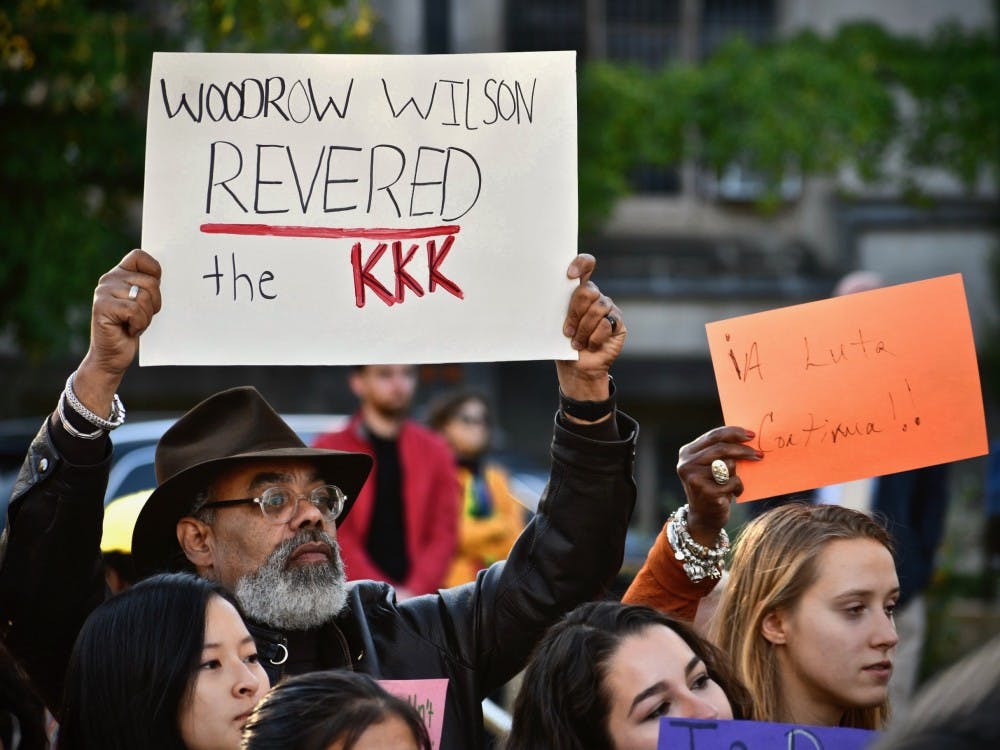“The man who has no sense of history, is like a man who has no ears or eyes,” Adolf Hitler once said.
As a gay, Black West Indian female, it’s absurd that I of all people am quoting an individual who would consider me an inferior abomination. Hitler’s racist and anti-Semitic ideologies and depraved antipathy to human life are clearly why he shouldn’t be quoted in a positive light, have statues erected in his name, or have buildings named after him, right?
According to Larry Giberson ’23, “wiping a man’s name from a college ... does [nothing] to solve these problems,” as he writes in his “Conundrum of Change” email criticism of the University’s decision to remove Woodrow Wilson’s name from the Princeton School of Public and International Affairs (SPIA) and First College.
By his logic, the Berlin Institute of Technology should’ve kept its former title “Adolf Hitler University”; Hitler laid the cornerstone for its expansion in 1938. What right did the Technical University of Berlin have to remove his name from their buildings after all he contributed to their foundations? After all, according to Giberson, “any survey of prominent historical figures will reveal uncomfortable truths incompatible with modern sensibilities,” so why should Hitler’s legacy be removed in the name of “wokeness” or popular opinion?
Simple: because a “conundrum of change” only exists when we try to rectify the injustices done onto the Black community by white America.
In case it’s not obvious that I’m being facetious, I do not support the immoral ideologies of the Nazi party, and I do not think Hitler deserves to have buildings or monuments named after him. Rather, I’m pointing out the hypocrisy that society rightly recognizes Hitler as a terrible person who should not be commemorated, yet does not reach the same consensus for a figure such as Woodrow Wilson, who praised the existence of “a great Klu Klux Klan … to protect the Southern country” from “ignorant negroes.”
It might seem silly for me to compare Hitler’s genocide and war crimes with Wilson’s bigotry. Many would hold Wilson as the lesser of the two evils and “not that bad” compared to Hitler. Those “many,” however, are often people like Giberson: Caucasians who feel entitled to an opinion which they cannot defend. As a white individual with the same racial identity as Wilson, who is Giberson to dictate what will restore Princeton’s “virtue and honor” and “solve” the injustices against Black students?
Wilson believed that Black people belonged to “an ignorant and inferior race.” He openly called us uneducated, lazy, and too irresponsible to govern a nation, let alone ourselves, unlike the superior white race. Wilson’s hateful and hurtful comments were directed towards Black people, yet time and time again, dissertations by white students who are somehow experts on why the University should not remove Wilson’s legacy plague our campus listservs.

Freedom of speech is often what many individuals such as Giberson claim gives them their right to speak on any topic of their choosing, and they’re not wrong. Everyone has the right to hold and express what they believe. The illusion, however, that everyone’s opinions and beliefs should be taken seriously is misguided.
If conspiracy theorists believe that the COVID-19 pandemic is an elaborate hoax set up by the government, then they have the right to hold and voice that opinion. But what relevant expertise do they have, compared to the Centers for Disease Control or medical professionals fighting to save the lives affected by this terrible virus, to broadcast their beliefs to the rest of the world? Why should their conspiracies and gross misinformation be treated as equally serious and important as recommendations from scientists studying the disease?
In the same vein, why does Giberson feel so entitled to preach to the student body his opinion on removing the legacy of a man who dehumanized and degraded Black lives?
Perhaps Giberson only takes issue with erasing the history that concerns his heritage as the “master race.” Had Princeton instead chosen to drop Carl A. Fields’ legacy for his involvement in the Battle of Saipan, would we still have received an email exposition calling our campus “cowardly'' for “discard[ing] [its] dignity”?

Within his thesis email, Giberson does make the point that removing Wilson’s name or “a woman’s face from a syrup bottle” does little to solve the racial issues that plague our society.
Wiping Wilson’s name from a building but keeping a monument in his name makes Princeton look and sound foolish, while replacing the Mammy “Aunt Jemima” character on syrup bottles doesn’t make up for the centuries that white Americans have profited off blackface.
But as small or nonsensical as these changes may be, they are important first steps that many American institutions are making towards larger and more necessary changes to improve our society. While they may do little to fix our social climate, these small actions triumph over Giberson’s proposal to leave everything the way it is, even if it’s racist, because we have to learn to both condemn the bad and honor the good.
If we as a Princeton and even global community are to ever amend and overcome the faults of our past, we need to understand that all change is important. If the leaders of our world possessed the same small-minded views of change as Giberson, Nazi imagery would still be legal in Germany, and Wilson would still have buildings named after him on our campus.
We must recognize that a “conundrum of change” only exists if you’re ignorant of the past, unwilling to admit that you’re wrong, and indifferent to the suffering of others. After all, why defend Hitler’s abhorrent words when you can quote the progressive Helen Keller: “The only thing worse than being blind is having sight and no vision.”
Imani Mulrain is a rising sophomore from Boston, Mass., concentrating in Molecular Biology. She can be reached at imulrain@princeton.edu.








